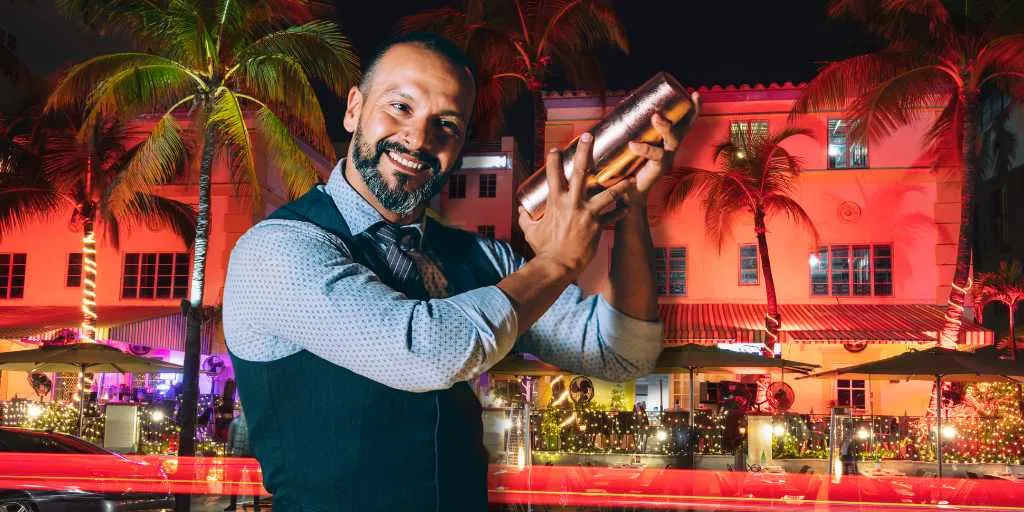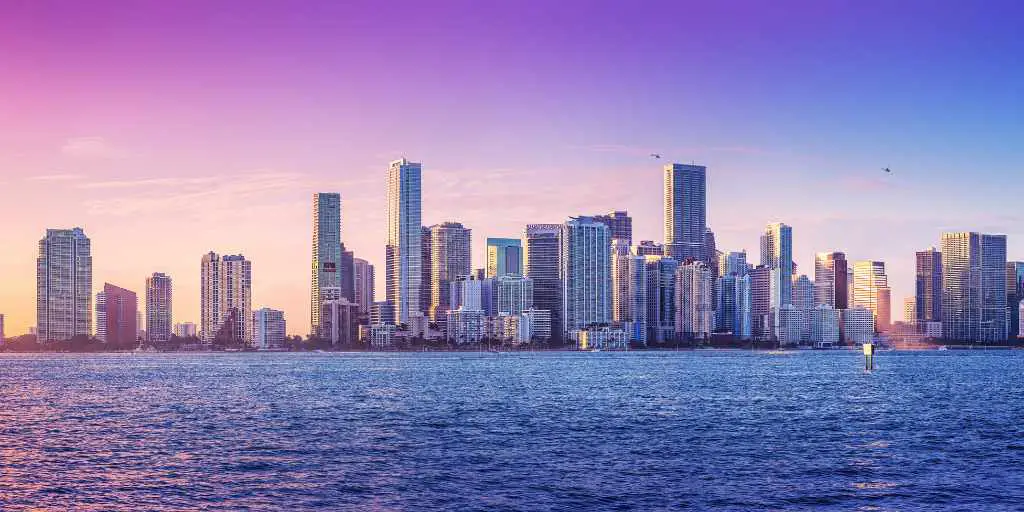A license is not required to become a bartender in Florida. However, specific training is mandatory if the restaurant/bar/employer you work for wishes to sell alcohol as a “responsible vendor” under the Florida Responsible Vendor Act.
Florida is the southeasternmost state in the U.S. On one side of it sits the Gulf of Mexico, and on the other, the Atlantic Ocean. Often referred to as the “Sunshine State”, with its many hundreds of miles of coastline and beaches, Florida has a vibrant outdoor bar and patio culture.
So, what does it take to become a bartender in this tourist-packed state? The remainder of this article explores the question, “How to become a bartender in Florida?” so that you know all there is to know about Florida bartending.
How To Become a Bartender in Florida
Becoming a bartender in the Sunshine State is fairly simple. However, there are just a few key items to remember when embarking on a bartending career in Florida.
You must be of legal age to serve alcohol. You may need to complete a certain training session though it is not mandated (it depends on the bar/restaurant/employer you are working for). And, of course, you will need a valid right to work in Florida, whether in the form of citizenship or one of the various working Visas.
The section below takes a deep dive into these few points on bartending in Florida as well as touches upon some of the most frequently asked questions when it comes to serving alcohol in Florida.
Does Florida Require a Bartending License?
The bartending license requirement varies from state to state and even city to city across the US. While some places will require training or a license, others will not, and Florida is one of those latter states.
There is no legal requirement for a bartending license to be able to serve alcohol in Florida currently.
However, many Florida bars, restaurants, hotels, and the like are part of the Responsible Vendor Program from the Florida Responsible Vendor Act. For an alcohol-serving institution to obtain its “responsible vendor” designation, each server must undergo the required training specified under the Act, which takes about two to three hours to complete.
To get your Responsible Vendor certificate for Florida, you must complete an alcohol seller-server course, such as those available from 360Training (on-premises seller-server training).
What is the Florida Responsible Vendor Act?
The Florida Responsible Vendor Act is a best practice guidance mechanism for any companies wishing to sell alcohol under the designation of “responsible vendor”.
What Does the Florida Responsible Vendor Act Mean?
All the Act and resulting designation mean is that the given alcohol vendor and their employees have undergone necessary training on the following topics (amongst others):
- How to eliminate the sale of alcohol to underaged persons
- How to reduce the occurrence of alcohol-related accidents
- How to prevent drug activity in combination with alcoholic beverages
- How to be prudent when serving, to restrict the sanctions that would be imposed on said vendors in the event of an alcohol-related incident
- Best practices for serving, marketing, and promoting alcohol, including preventing the over-consumption of alcoholic beverages on the premises in which that alcohol is being served
- Ensure alcohol is dealt with professionally and responsibly under all circumstances, understanding that a commitment to responsible service is vital when operating a successful and safe alcohol-serving company.
Why Do So Many Alcohol Vendors Require This Certification if It Is Not State-mandated?
The Florida Responsible Vendor designation is an attractive label for employers as it allows them to apply for insurance cost reductions. According to insurers, if their staff is certified as trained professionals who have undergone appropriate bartending training, accidents and mistakes are less likely.
Think of it as you would with certain driving schools that are not always mandated to get one’s driver’s license, but by completing them, your insurance costs are reduced once you start driving.
Having the Florida Responsible Vendor designation is also a great marketing tool for restaurants and bars, as it means customers can be assured that trained professionals are serving them.
For more information on the Florida Responsible Vendor Training, see this article.
How Much Does a Bartending Certification Cost?
The training required to be able to be hired by an employer operating under the Florida Responsible Vendor Act costs anywhere from $7.50 to $14.95, depending on which course you take.
If the course that you are looking at costs more than this, we advise you to proceed with caution, as many scammers wish to capitalize on training like this.
Often, employers will get a course discount by signing up as a company, so be sure to check with your potential employer regarding this before paying for it yourself.
We have a list of some Miami bartending schools here.
How Much Do Bartenders Make Hourly in Florida?
According to Indeed.com, bartenders make roughly $13.92 an hour before tips in Florida as of 2023. Now, this number will vary significantly from bar to bar. For instance, if you are bartending at the hottest beachfront bar in Miami, you will likely be making much more money in tips than at a local eatery in Lakeland.
How Old Do I Have To Be To Serve Alcohol?
In Florida, you have to be 18 years old to serve alcohol. However, many employers won’t consider you until you are 21 for simple liability purposes (source).
Do I Need a Clean Criminal History To Be a Bartender in Florida?
You will need a clean criminal history for at least five years before the year you apply to work as a bartender.
This is simply because it is considered unlawful for an alcohol vendor to employ an individual as a bartender if they have been convicted in the past five years. This includes criminal offences in Florida and any other state across the country.
Final Remarks
Now that you are well-versed in how to become a bartender in Florida, you’re one step closer to understanding the fascinating world of the global hospitality industry.
Remember, you don’t need a bartending license, but you may need some quick training, depending on your employer.
If you’re interested in bartending in other American states, we’ve written an article about bartending requirements across America here.





